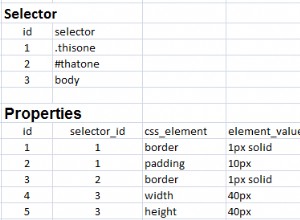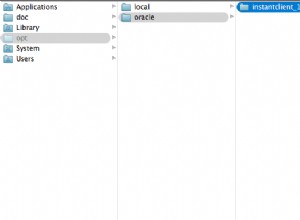Sí, no puede encontrar funciones en pg_class porque las funciones se almacenan en la tabla del sistema pg_proc
postgres-# \df
List of functions
Schema | Name | Result data type | Argument data types | Type
--------+--------------------+------------------+----------------------+--------
public | foo | integer | a integer, b integer | normal
public | function_arguments | text | oid | normal
(2 rows)
Consulta de lista de funciones personalizadas basadas en pg_proc es simplemente
postgres=# select p.oid::regprocedure
from pg_proc p
join pg_namespace n
on p.pronamespace = n.oid
where n.nspname not in ('pg_catalog', 'information_schema');
oid
-------------------------
foo(integer,integer)
function_arguments(oid)
(2 rows)
Las pruebas más sencillas y rápidas sobre la existencia de funciones son la conversión (sin parámetros) a regproc o regprocedure (con parámetros):
postgres=# select 'foo'::regproc;
regproc
---------
foo
(1 row)
postgres=# select 'foox'::regproc;
ERROR: function "foox" does not exist
LINE 1: select 'foox'::regproc;
^
postgres=# select 'foo(int, int)'::regprocedure;
regprocedure
----------------------
foo(integer,integer)
(1 row)
postgres=# select 'foo(int, text)'::regprocedure;
ERROR: function "foo(int, text)" does not exist
LINE 1: select 'foo(int, text)'::regprocedure;
^
o puede hacer algo similar con la prueba contra pg_proc
postgres=# select exists(select * from pg_proc where proname = 'foo');
exists
--------
t
(1 row)
postgres=# select exists(select *
from pg_proc
where proname = 'foo'
and function_arguments(oid) = 'integer, integer');
exists
--------
t
(1 row)
donde:
CREATE OR REPLACE FUNCTION public.function_arguments(oid)
RETURNS text LANGUAGE sql AS $function$
select string_agg(par, ', ')
from (select format_type(unnest(proargtypes), null) par
from pg_proc where oid = $1) x
$function$
o puede usar funciones de compilación:pg_get_function_arguments
PD. truco para simplemente orientarse en el catálogo del sistema. Usa un psql opción -E :
[[email protected] ~]$ psql -E postgres
psql (9.2.8, server 9.5devel)
Type "help" for help.
postgres=# \df
********* QUERY **********
SELECT n.nspname as "Schema",
p.proname as "Name",
pg_catalog.pg_get_function_result(p.oid) as "Result data type",
pg_catalog.pg_get_function_arguments(p.oid) as "Argument data types",
CASE
WHEN p.proisagg THEN 'agg'
WHEN p.proiswindow THEN 'window'
WHEN p.prorettype = 'pg_catalog.trigger'::pg_catalog.regtype THEN 'trigger'
ELSE 'normal'
END as "Type"
FROM pg_catalog.pg_proc p
LEFT JOIN pg_catalog.pg_namespace n ON n.oid = p.pronamespace
WHERE pg_catalog.pg_function_is_visible(p.oid)
AND n.nspname <> 'pg_catalog'
AND n.nspname <> 'information_schema'
ORDER BY 1, 2, 4;
**************************
List of functions
Schema | Name | Result data type | Argument data types | Type
--------+--------------------+------------------+----------------------+--------
public | foo | integer | a integer, b integer | normal
public | function_arguments | text | oid | normal
(2 rows)




